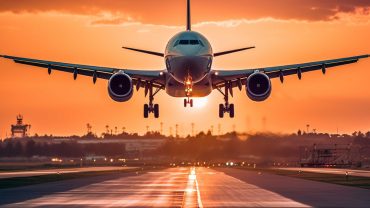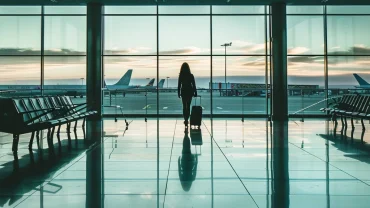ਰਾਤ ਨੂੰ ਸਸਤੀਆਂ ਫਲਾਈਟ ਟਿਕਟਾਂ ਦੀ ਮਿੱਥ: ਆਮ ਵਿਸ਼ਵਾਸ ਨੂੰ ਖਤਮ ਕਰਨਾ
ਜਾਣ-ਪਛਾਣ:
ਸਭ ਤੋਂ ਵਧੀਆ ਅਤੇ ਸਭ ਤੋਂ ਕਿਫਾਇਤੀ ਫਲਾਈਟ ਸੌਦੇ ਲੱਭਣ ਦੀ ਖੋਜ ਸ਼ੌਕੀਨ ਯਾਤਰੀਆਂ ਲਈ ਇੱਕ ਸਥਾਈ ਪਿੱਛਾ ਹੈ। ਯਾਤਰਾ ਸਲਾਹ ਦੇ ਖੇਤਰ ਵਿੱਚ ਘੁੰਮ ਰਹੇ ਅਣਗਿਣਤ ਸੁਝਾਵਾਂ ਅਤੇ ਜੁਗਤਾਂ ਵਿੱਚੋਂ, ਇੱਕ ਆਮ ਵਿਸ਼ਵਾਸ ਸਾਹਮਣੇ ਆਉਂਦਾ ਹੈ: ਰਾਤ ਨੂੰ ਉਡਾਣ ਦੀਆਂ ਟਿਕਟਾਂ ਸਸਤੀਆਂ ਹੁੰਦੀਆਂ ਹਨ। ਇਹ ਧਾਰਨਾ ਯਾਤਰੀਆਂ ਦੀਆਂ ਪੀੜ੍ਹੀਆਂ ਦੁਆਰਾ ਪਾਸ ਕੀਤੀ ਗਈ ਹੈ, ਜਿਸ ਨਾਲ ਬਹੁਤ ਸਾਰੇ ਲੋਕ ਆਪਣੀ ਔਨਲਾਈਨ ਟਿਕਟ ਖੋਜਾਂ ਦੀ ਸਾਵਧਾਨੀ ਨਾਲ ਯੋਜਨਾ ਬਣਾਉਣ ਲਈ ਅਗਵਾਈ ਕਰਦੇ ਹਨ, ਜਦੋਂ ਘੜੀ ਅੱਧੀ ਰਾਤ ਨੂੰ ਵੱਜਦੀ ਹੈ ਤਾਂ ਕੀਮਤ ਵਿੱਚ ਗਿਰਾਵਟ ਨੂੰ ਫੜਨ ਦੀ ਉਮੀਦ ਕੀਤੀ ਜਾਂਦੀ ਹੈ। ਹਾਲਾਂਕਿ, ਕੀ ਇਸ ਵਿਆਪਕ ਵਿਸ਼ਵਾਸ ਵਿੱਚ ਕੋਈ ਸੱਚਾਈ ਹੈ, ਜਾਂ ਕੀ ਇਹ ਹਵਾਈ ਯਾਤਰਾ ਦੀ ਸਦਾ-ਵਿਕਸਿਤ ਸੰਸਾਰ ਵਿੱਚ ਇੱਕ ਹੋਰ ਮਿੱਥ ਹੈ?
ਵਿਸ਼ਵਾਸ ਦੀ ਸ਼ੁਰੂਆਤ:
ਇਹ ਵਿਚਾਰ ਕਿ ਫਲਾਈਟ ਟਿਕਟਾਂ ਰਾਤ ਨੂੰ ਸਸਤੀਆਂ ਹੁੰਦੀਆਂ ਹਨ, ਆਨਲਾਈਨ ਫਲਾਈਟ ਬੁਕਿੰਗ ਪਲੇਟਫਾਰਮਾਂ ਦੇ ਸ਼ੁਰੂਆਤੀ ਦਿਨਾਂ ਤੋਂ ਪਤਾ ਲਗਾਇਆ ਜਾ ਸਕਦਾ ਹੈ। ਜਿਵੇਂ ਕਿ ਇੰਟਰਨੈਟ ਏਅਰਲਾਈਨ ਟਿਕਟਾਂ ਖਰੀਦਣ ਦਾ ਮੁੱਖ ਸਾਧਨ ਬਣ ਗਿਆ, ਉਪਭੋਗਤਾਵਾਂ ਨੇ ਦਿਨ ਦੇ ਵੱਖ-ਵੱਖ ਸਮਿਆਂ 'ਤੇ ਕੀਮਤਾਂ ਵਿੱਚ ਉਤਰਾਅ-ਚੜ੍ਹਾਅ ਦੇਖਣਾ ਸ਼ੁਰੂ ਕੀਤਾ। ਕੁਝ ਲੋਕਾਂ ਨੇ ਅੰਦਾਜ਼ਾ ਲਗਾਇਆ ਕਿ ਏਅਰਲਾਈਨਾਂ, ਹੌਲੀ ਘੰਟਿਆਂ ਦੌਰਾਨ ਟਿਕਟਾਂ ਦੀ ਵਿਕਰੀ ਨੂੰ ਵਧਾਉਣ ਦੀ ਕੋਸ਼ਿਸ਼ ਵਿੱਚ, ਰਾਤ ਨੂੰ ਕੀਮਤਾਂ ਨੂੰ ਘਟਾ ਸਕਦੀਆਂ ਹਨ, ਜਿਸ ਨਾਲ ਅਸੀਂ ਅੱਜ ਵੇਖਦੇ ਹਾਂ ਇਸ ਪ੍ਰਸਿੱਧ ਵਿਸ਼ਵਾਸ ਵੱਲ ਅਗਵਾਈ ਕਰਦੇ ਹਾਂ।
ਏਅਰਲਾਈਨ ਕੀਮਤ ਦੀ ਅਸਲੀਅਤ:
ਇਹ ਸਮਝਣ ਲਈ ਕਿ ਕੀ ਰਾਤ ਨੂੰ ਫਲਾਈਟ ਟਿਕਟਾਂ ਸੱਚਮੁੱਚ ਸਸਤੀਆਂ ਹੁੰਦੀਆਂ ਹਨ, ਏਅਰਲਾਈਨ ਦੀਆਂ ਕੀਮਤਾਂ ਦੀ ਗੁੰਝਲਦਾਰ ਦੁਨੀਆਂ ਵਿੱਚ ਜਾਣਨਾ ਜ਼ਰੂਰੀ ਹੈ। ਏਅਰਲਾਈਨਾਂ ਵਧੀਆ ਮਾਲੀਆ ਪ੍ਰਬੰਧਨ ਪ੍ਰਣਾਲੀਆਂ ਨੂੰ ਨਿਯੁਕਤ ਕਰਦੀਆਂ ਹਨ ਜੋ ਲਗਾਤਾਰ ਕਈ ਕਾਰਕਾਂ ਦਾ ਵਿਸ਼ਲੇਸ਼ਣ ਕਰਦੀਆਂ ਹਨ, ਜਿਸ ਵਿੱਚ ਮੰਗ, ਸੀਟ ਦੀ ਉਪਲਬਧਤਾ, ਮੁਕਾਬਲਾ ਅਤੇ ਇਤਿਹਾਸਕ ਡੇਟਾ ਸ਼ਾਮਲ ਹਨ। ਇਹ ਐਲਗੋਰਿਦਮ ਰੀਅਲ-ਟਾਈਮ ਵਿੱਚ ਟਿਕਟ ਦੀਆਂ ਕੀਮਤਾਂ ਨੂੰ ਗਤੀਸ਼ੀਲ ਰੂਪ ਵਿੱਚ ਵਿਵਸਥਿਤ ਕਰਦੇ ਹਨ, ਜਿਸ ਨਾਲ ਇਹ ਸੰਭਾਵਨਾ ਨਹੀਂ ਹੁੰਦੀ ਹੈ ਕਿ ਦਿਨ ਦਾ ਕੋਈ ਖਾਸ ਸਮਾਂ ਹੋਵੇ ਜਦੋਂ ਕੀਮਤਾਂ ਲਗਾਤਾਰ ਘਟਦੀਆਂ ਹਨ।
ਏਅਰਲਾਈਨ ਟਿਕਟ ਦੀਆਂ ਕੀਮਤਾਂ ਨੂੰ ਪ੍ਰਭਾਵਿਤ ਕਰਨ ਵਾਲੇ ਕਾਰਕ:
- ਮੰਗ ਅਤੇ ਸਪਲਾਈ: ਸਪਲਾਈ ਅਤੇ ਮੰਗ ਦਾ ਬੁਨਿਆਦੀ ਆਰਥਿਕ ਸਿਧਾਂਤ ਏਅਰਲਾਈਨ ਟਿਕਟ ਦੀਆਂ ਕੀਮਤਾਂ ਵਿੱਚ ਮਹੱਤਵਪੂਰਨ ਭੂਮਿਕਾ ਨਿਭਾਉਂਦਾ ਹੈ। ਸਿਖਰ ਯਾਤਰਾ ਦੇ ਸਮੇਂ, ਜਿਵੇਂ ਕਿ ਛੁੱਟੀਆਂ ਅਤੇ ਸ਼ਨੀਵਾਰ, ਮੰਗ ਵੱਧ ਹੁੰਦੀ ਹੈ, ਅਤੇ ਕੀਮਤਾਂ ਵਧਦੀਆਂ ਹਨ। ਇਸ ਦੇ ਉਲਟ, ਔਫ-ਪੀਕ ਘੰਟਿਆਂ ਜਾਂ ਦਿਨਾਂ ਦੌਰਾਨ, ਮੰਗ ਘਟਣ ਕਾਰਨ ਕੀਮਤਾਂ ਘੱਟ ਹੋ ਸਕਦੀਆਂ ਹਨ।
- ਵਿਕਰੀ ਅਤੇ ਪ੍ਰਚਾਰ: ਏਅਰਲਾਈਨਾਂ ਗਾਹਕਾਂ ਨੂੰ ਆਕਰਸ਼ਿਤ ਕਰਨ ਅਤੇ ਸੀਟਾਂ ਭਰਨ ਲਈ ਨਿਯਮਿਤ ਤੌਰ 'ਤੇ ਵਿਕਰੀ ਅਤੇ ਤਰੱਕੀਆਂ ਸ਼ੁਰੂ ਕਰਦੀਆਂ ਹਨ। ਇਹ ਤਰੱਕੀਆਂ ਦਿਨ ਦੇ ਕਿਸੇ ਖਾਸ ਸਮੇਂ ਦੁਆਰਾ ਬੰਨ੍ਹੇ ਨਹੀਂ ਹਨ; ਇਸ ਦੀ ਬਜਾਏ, ਉਹ ਰਣਨੀਤਕ ਤੌਰ 'ਤੇ ਯੋਜਨਾਬੱਧ ਹਨ ਅਤੇ ਕਿਸੇ ਵੀ ਸਮੇਂ ਹੋ ਸਕਦੇ ਹਨ।
- ਡਾਇਨਾਮਿਕ ਪ੍ਰਾਈਸਿੰਗ ਐਲਗੋਰਿਦਮ: ਏਅਰਲਾਈਨਾਂ ਗੁੰਝਲਦਾਰ ਐਲਗੋਰਿਦਮ ਵਰਤਦੀਆਂ ਹਨ ਜੋ ਟਿਕਟਾਂ ਦੀਆਂ ਕੀਮਤਾਂ ਨੂੰ ਗਤੀਸ਼ੀਲ ਰੂਪ ਵਿੱਚ ਵਿਵਸਥਿਤ ਕਰਨ ਲਈ ਵੱਖ-ਵੱਖ ਕਾਰਕਾਂ 'ਤੇ ਵਿਚਾਰ ਕਰਦੀਆਂ ਹਨ। ਇਹ ਐਲਗੋਰਿਦਮ ਲਗਾਤਾਰ ਕੰਮ ਕਰਦੇ ਹਨ, ਜਿਸ ਨਾਲ ਇਹ ਸੰਭਾਵਨਾ ਨਹੀਂ ਹੁੰਦੀ ਹੈ ਕਿ ਕੀਮਤਾਂ ਇੱਕ ਖਾਸ ਸਮੇਂ, ਜਿਵੇਂ ਕਿ ਰਾਤ ਦੇ ਦੌਰਾਨ ਲਗਾਤਾਰ ਘਟਣਗੀਆਂ।
- ਆਖਰੀ-ਮਿੰਟ ਦੇ ਸੌਦੇ: ਜਦੋਂ ਕਿ ਕੁਝ ਯਾਤਰੀਆਂ ਨੇ ਆਖਰੀ-ਮਿੰਟ ਦੇ ਵਧੀਆ ਸੌਦੇ ਲੱਭਣ ਦੀ ਰਿਪੋਰਟ ਕੀਤੀ ਹੈ, ਇਹ ਅਕਸਰ ਅਣਹੋਣੀ ਹੁੰਦੀਆਂ ਹਨ ਅਤੇ ਕਿਸੇ ਵੀ ਸਮੇਂ ਹੋ ਸਕਦੀਆਂ ਹਨ। ਆਖਰੀ-ਮਿੰਟ ਦੀਆਂ ਛੋਟਾਂ ਦਿਨ ਦੇ ਕਿਸੇ ਖਾਸ ਸਮੇਂ ਦੀ ਬਜਾਏ ਸੀਟ ਦੀ ਉਪਲਬਧਤਾ ਅਤੇ ਨਾ ਵਿਕੀਆਂ ਸੀਟਾਂ ਨੂੰ ਭਰਨ ਦੀ ਏਅਰਲਾਈਨ ਦੀ ਇੱਛਾ ਵਰਗੇ ਕਾਰਕਾਂ ਨਾਲ ਵਧੇਰੇ ਨੇੜਿਓਂ ਸਬੰਧਤ ਹਨ।
ਮਿੱਥ ਨੂੰ ਖਤਮ ਕਰਨਾ:
ਇਸ ਵਿਸ਼ਵਾਸ ਦੀ ਵੈਧਤਾ ਦੀ ਜਾਂਚ ਕਰਨ ਲਈ ਬਹੁਤ ਸਾਰੇ ਅਧਿਐਨ ਅਤੇ ਵਿਸ਼ਲੇਸ਼ਣ ਕੀਤੇ ਗਏ ਹਨ ਕਿ ਰਾਤ ਨੂੰ ਉਡਾਣ ਦੀਆਂ ਟਿਕਟਾਂ ਸਸਤੀਆਂ ਹੁੰਦੀਆਂ ਹਨ। ਹਾਲਾਂਕਿ, ਮਾਹਰਾਂ ਵਿੱਚ ਸਹਿਮਤੀ ਇਹ ਹੈ ਕਿ ਇਸ ਦਾਅਵੇ ਦਾ ਸਮਰਥਨ ਕਰਨ ਲਈ ਕੋਈ ਠੋਸ ਸਬੂਤ ਨਹੀਂ ਹੈ। ਏਅਰਲਾਈਨਾਂ ਇੱਕ ਬਹੁਤ ਹੀ ਪ੍ਰਤੀਯੋਗੀ ਬਾਜ਼ਾਰ ਵਿੱਚ ਕੰਮ ਕਰਦੀਆਂ ਹਨ, ਅਤੇ ਕੀਮਤ ਦੀਆਂ ਰਣਨੀਤੀਆਂ ਖਾਸ ਘੰਟਿਆਂ ਦੌਰਾਨ ਕੀਮਤਾਂ ਨੂੰ ਘਟਾਉਣ ਨਾਲੋਂ ਕਿਤੇ ਜ਼ਿਆਦਾ ਗੁੰਝਲਦਾਰ ਹੁੰਦੀਆਂ ਹਨ।
ਏਅਰਲਾਈਨ ਟਿਕਟ ਦੀ ਕੀਮਤ ਵਿੱਚ ਵਾਧੂ ਵਿਚਾਰ:
- ਮੌਸਮੀ ਭਿੰਨਤਾਵਾਂ:
- ਫਲਾਈਟ ਟਿਕਟ ਦੀਆਂ ਕੀਮਤਾਂ ਅਕਸਰ ਮੌਸਮੀ ਭਿੰਨਤਾਵਾਂ ਦੇ ਅਧੀਨ ਹੁੰਦੀਆਂ ਹਨ। ਏਅਰਲਾਈਨਾਂ ਮੌਸਮ, ਛੁੱਟੀਆਂ, ਅਤੇ ਪ੍ਰਸਿੱਧ ਯਾਤਰਾ ਸਮੇਂ ਵਰਗੇ ਕਾਰਕਾਂ ਦੇ ਆਧਾਰ 'ਤੇ ਆਪਣੀ ਕੀਮਤ ਨੂੰ ਵਿਵਸਥਿਤ ਕਰਦੀਆਂ ਹਨ। ਉਦਾਹਰਨ ਲਈ, ਚੋਟੀ ਦੀਆਂ ਛੁੱਟੀਆਂ ਦੇ ਸਮੇਂ ਵਿੱਚ, ਕੀਮਤਾਂ ਵੱਧ ਹੋਣ ਦੀ ਸੰਭਾਵਨਾ ਹੈ, ਜਦੋਂ ਕਿ ਆਫ-ਪੀਕ ਸੀਜ਼ਨ ਵਧੇਰੇ ਬਜਟ-ਅਨੁਕੂਲ ਵਿਕਲਪ ਪੇਸ਼ ਕਰ ਸਕਦੇ ਹਨ।
- ਐਡਵਾਂਸ ਵਿੱਚ ਬੁਕਿੰਗ:
- ਟਿਕਟ ਦੀਆਂ ਕੀਮਤਾਂ ਨੂੰ ਪ੍ਰਭਾਵਿਤ ਕਰਨ ਵਾਲਾ ਇੱਕ ਹੋਰ ਮਹੱਤਵਪੂਰਨ ਕਾਰਕ ਤੁਹਾਡੀ ਬੁਕਿੰਗ ਦਾ ਸਮਾਂ ਹੈ। ਆਮ ਤੌਰ 'ਤੇ, ਏਅਰਲਾਈਨਾਂ ਪਹਿਲਾਂ ਤੋਂ ਚੰਗੀ ਤਰ੍ਹਾਂ ਬੁੱਕ ਕੀਤੀਆਂ ਟਿਕਟਾਂ ਲਈ ਘੱਟ ਕੀਮਤਾਂ ਦੀ ਪੇਸ਼ਕਸ਼ ਕਰਦੀਆਂ ਹਨ। ਜਿਵੇਂ-ਜਿਵੇਂ ਰਵਾਨਗੀ ਦੀ ਤਾਰੀਖ ਨੇੜੇ ਆਉਂਦੀ ਹੈ, ਕੀਮਤਾਂ ਵਧ ਸਕਦੀਆਂ ਹਨ, ਖਾਸ ਕਰਕੇ ਪ੍ਰਸਿੱਧ ਰੂਟਾਂ ਲਈ।
- ਭੂਗੋਲਿਕ ਵਿਭਿੰਨਤਾਵਾਂ:
- ਵੱਖ-ਵੱਖ ਖੇਤਰਾਂ ਵਿੱਚ ਆਉਣ-ਜਾਣ ਦੀ ਲਾਗਤ ਕਾਫ਼ੀ ਵੱਖਰੀ ਹੋ ਸਕਦੀ ਹੈ। ਮੁਕਾਬਲੇ, ਸਥਾਨਕ ਆਰਥਿਕ ਸਥਿਤੀਆਂ ਅਤੇ ਸਰਕਾਰੀ ਨਿਯਮਾਂ ਵਰਗੇ ਕਾਰਕ ਕੀਮਤਾਂ ਨੂੰ ਪ੍ਰਭਾਵਿਤ ਕਰ ਸਕਦੇ ਹਨ। ਯਾਤਰੀਆਂ ਨੂੰ ਪਤਾ ਲੱਗ ਸਕਦਾ ਹੈ ਕਿ ਖਾਸ ਹਵਾਈ ਅੱਡਿਆਂ ਤੋਂ ਰਵਾਨਾ ਜਾਂ ਪਹੁੰਚਣ ਵਾਲੀਆਂ ਉਡਾਣਾਂ ਲਗਾਤਾਰ ਵਧੇਰੇ ਕਿਫਾਇਤੀ ਹਨ।
- ਏਅਰਲਾਈਨ ਲਾਇਲਟੀ ਪ੍ਰੋਗਰਾਮ:
- ਬਹੁਤ ਸਾਰੀਆਂ ਏਅਰਲਾਈਨਾਂ ਵਫ਼ਾਦਾਰੀ ਪ੍ਰੋਗਰਾਮਾਂ ਅਤੇ ਲਗਾਤਾਰ ਫਲਾਇਰ ਮੀਲ ਦੀ ਪੇਸ਼ਕਸ਼ ਕਰਦੀਆਂ ਹਨ ਜੋ ਹਵਾਈ ਯਾਤਰਾ ਦੀ ਸਮੁੱਚੀ ਲਾਗਤ ਨੂੰ ਮਹੱਤਵਪੂਰਨ ਤੌਰ 'ਤੇ ਪ੍ਰਭਾਵਿਤ ਕਰ ਸਕਦੀਆਂ ਹਨ। ਨਿਯਮਤ ਯਾਤਰਾ ਜਾਂ ਕ੍ਰੈਡਿਟ ਕਾਰਡ ਭਾਈਵਾਲੀ ਰਾਹੀਂ ਮੀਲਾਂ ਨੂੰ ਇਕੱਠਾ ਕਰਕੇ, ਯਾਤਰੀਆਂ ਨੂੰ ਇਹਨਾਂ ਮੀਲਾਂ ਨੂੰ ਛੂਟ ਵਾਲੀਆਂ ਜਾਂ ਮੁਫਤ ਉਡਾਣਾਂ ਲਈ ਰੀਡੀਮ ਕਰਨ ਦਾ ਮੌਕਾ ਮਿਲ ਸਕਦਾ ਹੈ।
- ਲਚਕਦਾਰ ਤਾਰੀਖਾਂ ਅਤੇ ਰਸਤੇ:
- ਤੁਹਾਡੀਆਂ ਯਾਤਰਾ ਦੀਆਂ ਤਾਰੀਖਾਂ ਨਾਲ ਲਚਕਦਾਰ ਹੋਣਾ ਅਤੇ ਵਿਕਲਪਕ ਰੂਟਾਂ 'ਤੇ ਵਿਚਾਰ ਕਰਨਾ ਵਧੇਰੇ ਕਿਫਾਇਤੀ ਉਡਾਣਾਂ ਲਈ ਮੌਕੇ ਖੋਲ੍ਹ ਸਕਦਾ ਹੈ। ਕੁਝ ਔਨਲਾਈਨ ਪਲੇਟਫਾਰਮ ਅਤੇ ਖੋਜ ਇੰਜਣ ਉਪਭੋਗਤਾਵਾਂ ਨੂੰ ਸਭ ਤੋਂ ਵੱਧ ਲਾਗਤ-ਪ੍ਰਭਾਵਸ਼ਾਲੀ ਵਿਕਲਪ ਉਪਲਬਧ ਹੋਣ 'ਤੇ ਇੱਕ ਵਿਆਪਕ ਦ੍ਰਿਸ਼ਟੀਕੋਣ ਪ੍ਰਦਾਨ ਕਰਦੇ ਹੋਏ, ਮਿਤੀ ਦੀਆਂ ਰੇਂਜਾਂ ਦੀ ਪੜਚੋਲ ਕਰਨ ਦੀ ਇਜਾਜ਼ਤ ਦਿੰਦੇ ਹਨ।
- ਤੁਲਨਾ ਖਰੀਦਦਾਰੀ:
- ਤੁਲਨਾਤਮਕ ਖਰੀਦਦਾਰੀ ਦੀ ਮਹੱਤਤਾ ਨੂੰ ਜ਼ਿਆਦਾ ਨਹੀਂ ਦੱਸਿਆ ਜਾ ਸਕਦਾ। ਵੱਖ-ਵੱਖ ਏਅਰਲਾਈਨਾਂ ਅਤੇ ਟਰੈਵਲ ਏਜੰਸੀਆਂ ਦੀਆਂ ਇੱਕੋ ਰੂਟ ਅਤੇ ਸ਼੍ਰੇਣੀ ਲਈ ਵੱਖ-ਵੱਖ ਕੀਮਤਾਂ ਹੋ ਸਕਦੀਆਂ ਹਨ। ਕਈ ਖੋਜ ਇੰਜਣਾਂ ਅਤੇ ਔਨਲਾਈਨ ਟਰੈਵਲ ਏਜੰਸੀਆਂ ਦੀ ਵਰਤੋਂ ਕਰਨ ਨਾਲ ਯਾਤਰੀਆਂ ਨੂੰ ਸਭ ਤੋਂ ਵੱਧ ਮੁਕਾਬਲੇ ਵਾਲੇ ਸੌਦਿਆਂ ਦੀ ਪਛਾਣ ਕਰਨ ਵਿੱਚ ਮਦਦ ਮਿਲ ਸਕਦੀ ਹੈ।
- ਆਰਥਿਕ ਕਾਰਕ:
- ਬਾਹਰੀ ਆਰਥਿਕ ਕਾਰਕ, ਜਿਵੇਂ ਕਿ ਬਾਲਣ ਦੀਆਂ ਕੀਮਤਾਂ ਅਤੇ ਭੂ-ਰਾਜਨੀਤਿਕ ਘਟਨਾਵਾਂ, ਏਅਰਲਾਈਨ ਟਿਕਟ ਦੀਆਂ ਕੀਮਤਾਂ ਨੂੰ ਪ੍ਰਭਾਵਿਤ ਕਰ ਸਕਦੀਆਂ ਹਨ। ਅਣਕਿਆਸੀਆਂ ਸਥਿਤੀਆਂ, ਜਿਵੇਂ ਕਿ ਬਾਲਣ ਦੀਆਂ ਕੀਮਤਾਂ ਵਿੱਚ ਅਚਾਨਕ ਵਾਧਾ ਜਾਂ ਗਲੋਬਲ ਯਾਤਰਾ ਦੇ ਪੈਟਰਨਾਂ ਵਿੱਚ ਰੁਕਾਵਟਾਂ, ਉਦਯੋਗ ਵਿੱਚ ਕੀਮਤਾਂ ਦੇ ਸਮਾਯੋਜਨ ਦਾ ਕਾਰਨ ਬਣ ਸਕਦੀਆਂ ਹਨ।
- ਸਮਾਂ ਖੇਤਰ ਅੰਤਰ:
- ਹਾਲਾਂਕਿ "ਰਾਤ" ਦੀ ਧਾਰਨਾ ਤੁਹਾਡੇ ਸਥਾਨ ਦੇ ਆਧਾਰ 'ਤੇ ਵੱਖ-ਵੱਖ ਹੋ ਸਕਦੀ ਹੈ, ਸਮਾਂ ਜ਼ੋਨ ਦੇ ਅੰਤਰ ਵੀ ਸਮਝੇ ਗਏ ਵਿਚਾਰ ਵਿੱਚ ਇੱਕ ਭੂਮਿਕਾ ਨਿਭਾਉਂਦੇ ਹਨ ਕਿ ਟਿਕਟਾਂ ਰਾਤ ਨੂੰ ਸਸਤੀਆਂ ਹੁੰਦੀਆਂ ਹਨ। ਵੱਖ-ਵੱਖ ਖੇਤਰਾਂ ਵਿੱਚ ਬਜ਼ਾਰ ਦੀਆਂ ਸਥਿਤੀਆਂ ਦੇ ਕਾਰਨ ਕੀਮਤਾਂ ਬਦਲ ਸਕਦੀਆਂ ਹਨ, ਪਰ ਇਹ ਤਬਦੀਲੀਆਂ ਇੱਕ ਵਿਆਪਕ ਅਰਥਾਂ ਵਿੱਚ ਦਿਨ ਦੇ ਇੱਕ ਖਾਸ ਸਮੇਂ ਨਾਲ ਜੁੜੀਆਂ ਹੋਣੀਆਂ ਜ਼ਰੂਰੀ ਨਹੀਂ ਹਨ।
ਇਸ ਬਾਰੇ ਹੋਰ:
- ਕੀਮਤ ਦੀ ਗਤੀਸ਼ੀਲ ਪ੍ਰਕਿਰਤੀ:
- ਏਅਰਲਾਈਨ ਉਦਯੋਗ ਲਗਾਤਾਰ ਬਦਲਦੇ ਮਾਹੌਲ ਵਿੱਚ ਕੰਮ ਕਰਦਾ ਹੈ, ਕੀਮਤਾਂ ਅਸਲ-ਸਮੇਂ ਦੇ ਡੇਟਾ ਦੇ ਆਧਾਰ 'ਤੇ ਗਤੀਸ਼ੀਲ ਤੌਰ 'ਤੇ ਵਿਵਸਥਿਤ ਹੁੰਦੀਆਂ ਹਨ। ਏਅਰਲਾਈਨਾਂ ਬਾਜ਼ਾਰ ਦੇ ਉਤਰਾਅ-ਚੜ੍ਹਾਅ, ਪ੍ਰਤੀਯੋਗੀ ਕਾਰਵਾਈਆਂ ਅਤੇ ਗਾਹਕਾਂ ਦੀ ਮੰਗ ਦਾ ਜਵਾਬ ਦੇਣ ਲਈ ਵਧੀਆ ਐਲਗੋਰਿਦਮ ਦੀ ਵਰਤੋਂ ਕਰਦੀਆਂ ਹਨ। ਨਤੀਜੇ ਵਜੋਂ, ਦਿਨ ਦੇ ਇੱਕ ਖਾਸ ਸਮੇਂ ਦੀ ਧਾਰਣਾ ਘੱਟ ਕੀਮਤਾਂ ਨੂੰ ਨਿਰਧਾਰਤ ਕਰਦੀ ਹੈ, ਇਹਨਾਂ ਕੀਮਤ ਮਾਡਲਾਂ ਦੇ ਗੁੰਝਲਦਾਰ, ਜਵਾਬਦੇਹ ਸੁਭਾਅ ਨੂੰ ਨਜ਼ਰਅੰਦਾਜ਼ ਕਰਦੀ ਹੈ।
- ਲੁਕੀਆਂ ਹੋਈਆਂ ਫੀਸਾਂ ਅਤੇ ਖਰਚੇ:
- ਫਲਾਈਟ ਟਿਕਟਾਂ ਦੀ ਖੋਜ ਕਰਦੇ ਸਮੇਂ, ਸੰਭਾਵੀ ਲੁਕੀਆਂ ਹੋਈਆਂ ਫੀਸਾਂ ਅਤੇ ਖਰਚਿਆਂ ਬਾਰੇ ਸੁਚੇਤ ਹੋਣਾ ਜ਼ਰੂਰੀ ਹੈ। ਕੁਝ ਏਅਰਲਾਈਨਾਂ ਘੱਟ ਬੇਸ ਕਿਰਾਏ ਦਾ ਇਸ਼ਤਿਹਾਰ ਦੇ ਸਕਦੀਆਂ ਹਨ ਪਰ ਸੇਵਾਵਾਂ ਜਿਵੇਂ ਕਿ ਸਮਾਨ, ਸੀਟ ਦੀ ਚੋਣ, ਜਾਂ ਫਲਾਈਟ ਦੀਆਂ ਸਹੂਲਤਾਂ ਲਈ ਵਾਧੂ ਖਰਚਿਆਂ ਨਾਲ ਮੁਆਵਜ਼ਾ ਦਿੰਦੀਆਂ ਹਨ। ਇੱਕ ਟਿਕਟ ਦੀ ਸਮੁੱਚੀ ਲਾਗਤ-ਪ੍ਰਭਾਵ ਵਿੱਚ ਇਹ ਵਾਧੂ ਚੀਜ਼ਾਂ ਸ਼ਾਮਲ ਹਨ, ਜੋ ਸ਼ੁਰੂਆਤੀ ਖੋਜ ਦੌਰਾਨ ਸਪੱਸ਼ਟ ਨਹੀਂ ਹੋ ਸਕਦੀਆਂ।
- ਮੁਦਰਾਵਾਂ ਅਤੇ ਵਟਾਂਦਰਾ ਦਰਾਂ:
- ਅੰਤਰਰਾਸ਼ਟਰੀ ਯਾਤਰਾ ਜਟਿਲਤਾ ਦੀ ਇੱਕ ਹੋਰ ਪਰਤ ਪੇਸ਼ ਕਰਦੀ ਹੈ, ਜਿਸ ਵਿੱਚ ਮੁਦਰਾ ਵਟਾਂਦਰਾ ਦਰਾਂ ਸ਼ਾਮਲ ਹੁੰਦੀਆਂ ਹਨ। ਐਕਸਚੇਂਜ ਦਰਾਂ ਵਿੱਚ ਉਤਰਾਅ-ਚੜ੍ਹਾਅ ਟਿਕਟ ਦੀ ਅੰਤਿਮ ਕੀਮਤ ਨੂੰ ਪ੍ਰਭਾਵਿਤ ਕਰ ਸਕਦੇ ਹਨ, ਖਾਸ ਕਰਕੇ ਜਦੋਂ ਵਿਦੇਸ਼ੀ ਮੁਦਰਾ ਵਿੱਚ ਬੁਕਿੰਗ ਕਰਦੇ ਹੋ। ਸਭ ਤੋਂ ਵਧੀਆ ਮੁੱਲ ਦੀ ਮੰਗ ਕਰਨ ਵਾਲੇ ਯਾਤਰੀਆਂ ਲਈ ਐਕਸਚੇਂਜ ਦਰਾਂ ਦੀ ਨਿਗਰਾਨੀ ਕਰਨਾ ਅਤੇ ਕੀਮਤਾਂ 'ਤੇ ਪ੍ਰਭਾਵ ਨੂੰ ਸਮਝਣਾ ਮਹੱਤਵਪੂਰਨ ਹੋ ਸਕਦਾ ਹੈ।
- ਬੁਕਿੰਗ ਚੈਨਲਾਂ ਦਾ ਪ੍ਰਭਾਵ:
- ਜਿਸ ਪਲੇਟਫਾਰਮ ਰਾਹੀਂ ਟਿਕਟ ਬੁੱਕ ਕੀਤੀ ਜਾਂਦੀ ਹੈ, ਉਹ ਅੰਤਿਮ ਕੀਮਤ ਨੂੰ ਵੀ ਪ੍ਰਭਾਵਿਤ ਕਰ ਸਕਦਾ ਹੈ। ਏਅਰਲਾਈਨਾਂ ਆਪਣੀਆਂ ਵੈੱਬਸਾਈਟਾਂ ਰਾਹੀਂ ਵਿਸ਼ੇਸ਼ ਸੌਦਿਆਂ ਦੀ ਪੇਸ਼ਕਸ਼ ਕਰ ਸਕਦੀਆਂ ਹਨ, ਜਦੋਂ ਕਿ ਤੀਜੀ-ਧਿਰ ਦੀਆਂ ਯਾਤਰਾ ਏਜੰਸੀਆਂ ਕੋਲ ਤਰੱਕੀਆਂ ਜਾਂ ਪੈਕੇਜ ਸੌਦੇ ਹੋ ਸਕਦੇ ਹਨ। ਸਭ ਤੋਂ ਵੱਧ ਲਾਗਤ-ਪ੍ਰਭਾਵਸ਼ਾਲੀ ਵਿਕਲਪਾਂ ਦੀ ਪਛਾਣ ਕਰਨ ਲਈ ਯਾਤਰੀਆਂ ਨੂੰ ਵੱਖ-ਵੱਖ ਬੁਕਿੰਗ ਚੈਨਲਾਂ ਦੀ ਪੜਚੋਲ ਕਰਨ ਦੀ ਸਲਾਹ ਦਿੱਤੀ ਜਾਂਦੀ ਹੈ।
- ਵਿਕਸਤ ਉਦਯੋਗਿਕ ਰੁਝਾਨ:
- ਏਅਰਲਾਈਨ ਉਦਯੋਗ ਵਿਕਾਸਸ਼ੀਲ ਰੁਝਾਨਾਂ ਅਤੇ ਨਵੀਨਤਾਵਾਂ ਦੇ ਅਧੀਨ ਹੈ ਜੋ ਕੀਮਤ ਦੀਆਂ ਰਣਨੀਤੀਆਂ ਨੂੰ ਪ੍ਰਭਾਵਤ ਕਰ ਸਕਦੇ ਹਨ। ਉਦਾਹਰਨ ਲਈ, ਬਜਟ ਏਅਰਲਾਈਨਾਂ ਦੇ ਉਭਾਰ ਅਤੇ ਅਨਬੰਡਲ ਕੀਮਤ (ਜਿੱਥੇ ਯਾਤਰੀ ਵੱਖ-ਵੱਖ ਸੇਵਾਵਾਂ ਲਈ ਵੱਖਰੇ ਤੌਰ 'ਤੇ ਭੁਗਤਾਨ ਕਰਦੇ ਹਨ) ਵੱਲ ਤਬਦੀਲੀ ਨੇ ਕੀਮਤ ਦੇ ਲੈਂਡਸਕੇਪ ਵਿੱਚ ਨਵੀਂ ਗਤੀਸ਼ੀਲਤਾ ਪੇਸ਼ ਕੀਤੀ ਹੈ। ਉਦਯੋਗ ਦੇ ਰੁਝਾਨਾਂ ਬਾਰੇ ਸੂਚਿਤ ਰਹਿਣਾ ਯਾਤਰੀਆਂ ਨੂੰ ਵਿਕਸਤ ਹੋ ਰਹੇ ਬਾਜ਼ਾਰਾਂ ਵਿੱਚ ਨੈਵੀਗੇਟ ਕਰਨ ਵਿੱਚ ਮਦਦ ਕਰ ਸਕਦਾ ਹੈ।
- ਮਾਰਕੀਟ ਮੁਕਾਬਲਾ:
- ਕਿਸੇ ਖਾਸ ਰੂਟ 'ਤੇ ਮੁਕਾਬਲੇ ਦਾ ਪੱਧਰ ਟਿਕਟ ਦੀਆਂ ਕੀਮਤਾਂ ਨੂੰ ਮਹੱਤਵਪੂਰਨ ਤੌਰ 'ਤੇ ਪ੍ਰਭਾਵਿਤ ਕਰਦਾ ਹੈ। ਉੱਚ ਮੁਕਾਬਲਾ ਅਕਸਰ ਵਧੇਰੇ ਪ੍ਰਤੀਯੋਗੀ ਕੀਮਤਾਂ ਵੱਲ ਲੈ ਜਾਂਦਾ ਹੈ ਕਿਉਂਕਿ ਏਅਰਲਾਈਨਾਂ ਯਾਤਰੀਆਂ ਨੂੰ ਆਕਰਸ਼ਿਤ ਕਰਨ ਦੀ ਕੋਸ਼ਿਸ਼ ਕਰਦੀਆਂ ਹਨ। ਇਸ ਦੇ ਉਲਟ, ਸੀਮਤ ਮੁਕਾਬਲੇ ਵਾਲੇ ਰੂਟ ਉੱਚ ਕੀਮਤਾਂ ਦਾ ਅਨੁਭਵ ਕਰ ਸਕਦੇ ਹਨ। ਪ੍ਰਤੀਯੋਗੀ ਲੈਂਡਸਕੇਪ ਨੂੰ ਸਮਝਣਾ ਸਭ ਤੋਂ ਵਧੀਆ ਸੌਦਿਆਂ ਦੀ ਮੰਗ ਕਰਨ ਵਾਲੇ ਯਾਤਰੀਆਂ ਲਈ ਫਾਇਦੇਮੰਦ ਹੋ ਸਕਦਾ ਹੈ।
- ਏਅਰਲਾਈਨ ਵਿਕਰੀ ਅਤੇ ਫਲੈਸ਼ ਡੀਲ:
- ਹਾਲਾਂਕਿ ਇਹ ਜ਼ਰੂਰੀ ਤੌਰ 'ਤੇ ਦਿਨ ਦੇ ਖਾਸ ਸਮੇਂ ਨਾਲ ਜੁੜਿਆ ਨਹੀਂ ਹੈ, ਏਅਰਲਾਈਨਾਂ ਮੰਗ ਨੂੰ ਉਤਸ਼ਾਹਿਤ ਕਰਨ ਲਈ ਅਕਸਰ ਵਿਕਰੀ ਅਤੇ ਫਲੈਸ਼ ਸੌਦੇ ਸ਼ੁਰੂ ਕਰਦੀਆਂ ਹਨ। ਇਹ ਤਰੱਕੀਆਂ ਕਾਫ਼ੀ ਛੋਟਾਂ ਦੀ ਪੇਸ਼ਕਸ਼ ਕਰ ਸਕਦੀਆਂ ਹਨ ਪਰ ਅਕਸਰ ਸਮਾਂ-ਸੰਵੇਦਨਸ਼ੀਲ ਹੁੰਦੀਆਂ ਹਨ। ਏਅਰਲਾਈਨ ਨਿਊਜ਼ਲੈਟਰਾਂ ਦੀ ਗਾਹਕੀ ਲੈਣਾ, ਸੋਸ਼ਲ ਮੀਡੀਆ 'ਤੇ ਉਹਨਾਂ ਦਾ ਅਨੁਸਰਣ ਕਰਨਾ, ਜਾਂ ਸਮਰਪਿਤ ਸੌਦਾ-ਲੱਭਣ ਵਾਲੀਆਂ ਵੈਬਸਾਈਟਾਂ ਦੀ ਵਰਤੋਂ ਕਰਨਾ ਯਾਤਰੀਆਂ ਨੂੰ ਇਹਨਾਂ ਸੀਮਤ-ਸਮੇਂ ਦੀਆਂ ਪੇਸ਼ਕਸ਼ਾਂ ਨੂੰ ਫੜਨ ਵਿੱਚ ਮਦਦ ਕਰ ਸਕਦਾ ਹੈ।
- ਸੰਖੇਪ ਵਿੱਚ, ਕਿਫਾਇਤੀ ਫਲਾਈਟ ਟਿਕਟਾਂ ਦੀ ਖੋਜ ਵਿੱਚ ਆਰਥਿਕ ਸਥਿਤੀਆਂ ਤੋਂ ਲੈ ਕੇ ਉਦਯੋਗ ਦੇ ਰੁਝਾਨਾਂ ਤੱਕ, ਵੱਖ-ਵੱਖ ਕਾਰਕਾਂ ਨੂੰ ਸ਼ਾਮਲ ਕਰਦੇ ਹੋਏ ਇੱਕ ਬਹੁਪੱਖੀ ਲੈਂਡਸਕੇਪ ਨੂੰ ਨੈਵੀਗੇਟ ਕਰਨਾ ਸ਼ਾਮਲ ਹੈ। ਇਹ ਵਿਸ਼ਵਾਸ ਕਿ ਫਲਾਈਟ ਟਿਕਟਾਂ ਰਾਤ ਨੂੰ ਲਗਾਤਾਰ ਸਸਤੀਆਂ ਹੁੰਦੀਆਂ ਹਨ, ਏਅਰਲਾਈਨ ਦੀਆਂ ਕੀਮਤਾਂ ਦੀ ਗੁੰਝਲਤਾ ਨੂੰ ਸਰਲ ਬਣਾਉਂਦਾ ਹੈ। ਇਸ ਦੀ ਬਜਾਏ, ਯਾਤਰੀ ਸੂਚਿਤ ਰਹਿ ਕੇ, ਲਚਕਦਾਰ ਬਣ ਕੇ, ਵਾਧੂ ਫੀਸਾਂ 'ਤੇ ਵਿਚਾਰ ਕਰਕੇ, ਅਤੇ ਬੁਕਿੰਗ ਚੈਨਲਾਂ ਦੀ ਇੱਕ ਸ਼੍ਰੇਣੀ ਦੀ ਪੜਚੋਲ ਕਰਕੇ ਸਭ ਤੋਂ ਵਧੀਆ ਸੌਦੇ ਲੱਭਣ ਦੀਆਂ ਸੰਭਾਵਨਾਵਾਂ ਨੂੰ ਅਨੁਕੂਲ ਬਣਾ ਸਕਦੇ ਹਨ। ਜਿਵੇਂ ਕਿ ਏਅਰਲਾਈਨ ਉਦਯੋਗ ਦਾ ਵਿਕਾਸ ਕਰਨਾ ਜਾਰੀ ਹੈ, ਉਸੇ ਤਰ੍ਹਾਂ ਮੁਸਾਫਰਾਂ ਨੂੰ ਲਾਗਤ-ਪ੍ਰਭਾਵਸ਼ਾਲੀ ਅਤੇ ਆਨੰਦਦਾਇਕ ਯਾਤਰਾਵਾਂ ਨੂੰ ਸੁਰੱਖਿਅਤ ਕਰਨ ਲਈ ਰਣਨੀਤੀਆਂ ਵੀ ਵਰਤਣੀਆਂ ਚਾਹੀਦੀਆਂ ਹਨ।



ਟਿੱਪਣੀ (0)